‘Sordid Lives’ elixir for what ails you post Hurricane Irma
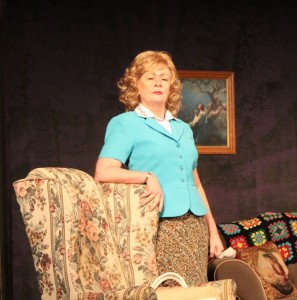 Del Shores’ Sordid Lives opens at Lab Theater on September 21. Long touted as a gay cult classic, the play is hysterically funny whether you’re straight or LGBTQ. That’s because Shores’ dialogue is droll and snarky, his characters deeply relatable, his theme profound and universal. At its essence, Sordid Lives is about love and acceptance, and who doesn’t strive for that?
Del Shores’ Sordid Lives opens at Lab Theater on September 21. Long touted as a gay cult classic, the play is hysterically funny whether you’re straight or LGBTQ. That’s because Shores’ dialogue is droll and snarky, his characters deeply relatable, his theme profound and universal. At its essence, Sordid Lives is about love and acceptance, and who doesn’t strive for that?
The play is set in a small, conservative Texas town by the name of Winters, where Peggy Ingram’s family and friends are coming to terms with the matriarch’s sudden, rather ignominious 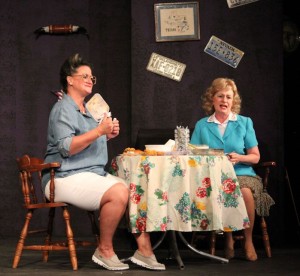 passing. She tripped over her consort’s wooden legs and cracked her noggin wide open on the bathroom sink of the seedy motel that served as their secret rendezvous.
passing. She tripped over her consort’s wooden legs and cracked her noggin wide open on the bathroom sink of the seedy motel that served as their secret rendezvous.
But that’s just the half of it.
What has everyone so riled up is that Peggy’s paramour was her next door neighbor, G.W. Nethercott, who’s married and Peggy’s junior by some four decades.
S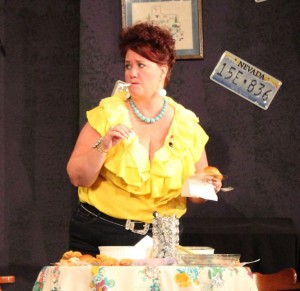 ince the play’s premiere in 1996, the characters that Shores inserted into this backstory have taken on a life of their own. Even today, it is commonplace for people to show up at Halloween and costume parties dressed as Latrelle Williamson, LaVonda Dupree, Juanita Bartlett and, of course, Earl “Brother Boy” Ingram. But irascible, three-dimensional characters require an astute and committed cast. Director Scott Carpenter has assembled a gem of experienced actors and enthusiastic newcomers. There’s not a
ince the play’s premiere in 1996, the characters that Shores inserted into this backstory have taken on a life of their own. Even today, it is commonplace for people to show up at Halloween and costume parties dressed as Latrelle Williamson, LaVonda Dupree, Juanita Bartlett and, of course, Earl “Brother Boy” Ingram. But irascible, three-dimensional characters require an astute and committed cast. Director Scott Carpenter has assembled a gem of experienced actors and enthusiastic newcomers. There’s not a 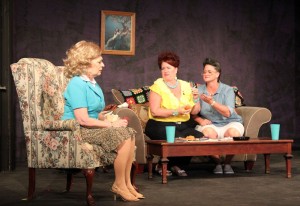 weak link in the bunch.
weak link in the bunch.
“I wouldn’t permit it,” Carpenter remarked in a recent phone interview. He wasn’t kidding.
He simply could not have made a better choice for the role of Latrelle Williamson than Joann Haley, who shined as the dignified and restrained Alice Russell in last year’s Lab opener, The Best Man. As Latrelle, 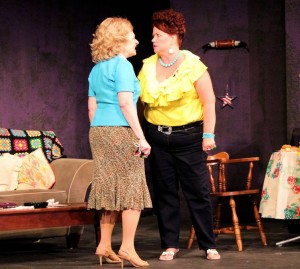 Haley gets just how important it is to her character to keep up appearances in the predominantly Southern Baptist burgh in which they live. That’s why her transvestite brother was locked away in an asylum 23 years ago and why her son had to flee to L.A., then New York, in order to embrace his own sexual orientation. But in addition to keeping a lid on the unfolding scandal, Latrelle’s biggest problem is her sister, LaVonda. The woman actually wants to bury mom in a mink stole in the heat of the Texas
Haley gets just how important it is to her character to keep up appearances in the predominantly Southern Baptist burgh in which they live. That’s why her transvestite brother was locked away in an asylum 23 years ago and why her son had to flee to L.A., then New York, in order to embrace his own sexual orientation. But in addition to keeping a lid on the unfolding scandal, Latrelle’s biggest problem is her sister, LaVonda. The woman actually wants to bury mom in a mink stole in the heat of the Texas 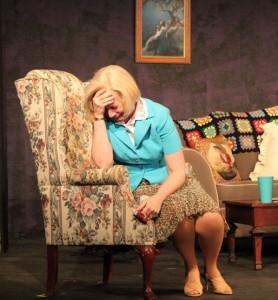 summer! I mean, have you ever? Haley is the epitome of breath-catching exasperation.
summer! I mean, have you ever? Haley is the epitome of breath-catching exasperation.
Stacy Peres excels in the role of Peggy’s sibling, Sissy Hickey. Sissy could care less about that stupid mink stole. She’s trying to quit smoking. But instead of shelling out a bushel of money for a Pavlok electric shock wristband, she’s settled upon popping her wrist with a rubber band each time she gets the urge to smoke. But even funnier is the way Peres has her character sucking in huge draughts of second-hand smoke each 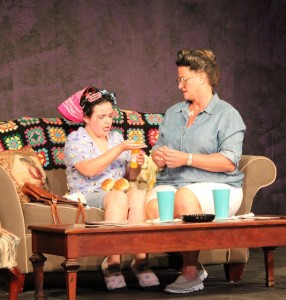 time LaVonda lights up during the play’s aptly named first act, “Nictotine Fit.”
time LaVonda lights up during the play’s aptly named first act, “Nictotine Fit.”
Every family has that flamboyant aunt who shows a bit too much cleavage, acts half her age and keeps you in stitches with her antics and wry observations. In the Ingram family, that’s LaVonda Dupree. In this role, Scott Carpenter cast the incomparable Cindi Heimberg, who goes completely over the top as Noleta Nethercott’s gun-toting sidekick when, in Act Two, the duo invade Bubba’s Bar to exact retribution against Noleta’s low-life, cheating husband and his h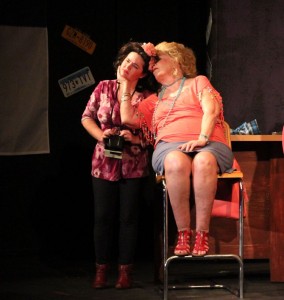 apless pals,
apless pals,
No one attacks their role with more enthusiasm, zest and pure joy than Kayleigh O’Connell, who plays Noleta Nethercott. When the audience first meets Noleta, she’s in curlers, washing down rolls, deli meats and Valium with Sissy’s sweat tea. But O’Connell really hits her theatrical stride as she humiliates her husband and his bar buddies at gunpoint in one of the funniest comeuppances in the sordid history of theater. (Hint: It’s even more satisfying than the video that Carrie Underwood shot for “Maybe 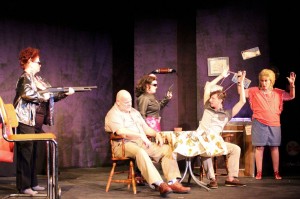 He’ll Think the Next Time Before He Cheats.”)
He’ll Think the Next Time Before He Cheats.”)
Although they are primarily foils for other characters, Brian Linthicum, Patrick Erhardt and Chet Gridley are superb as the tortured and conflicted G.W. Nethercott, Wardell Bubba Owens and Odell Owens. Patricia Clopton couldn’t be funnier as the t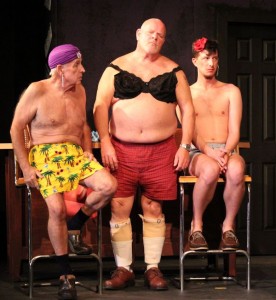 own drunk, Juanita Bartlett. She delivers her dry, bitter quips with the smoothness of a Martini Riserva Ambrato Vermouth. But the three stand-outs in this production are unquestionably Drew Larman, Sandra Dixon and Ken Johnson.
own drunk, Juanita Bartlett. She delivers her dry, bitter quips with the smoothness of a Martini Riserva Ambrato Vermouth. But the three stand-outs in this production are unquestionably Drew Larman, Sandra Dixon and Ken Johnson.
Larman is masterful. In the role of Latrelle’s gay son, Ty, he counterbalances the slapdash humor in the rest of the show with poignant interludes with an unseen and unheard therapist who tries to help him deal with his unfulfilled need for his mother’s love and acceptance. As a child, his mother would change the labels on his jeans from “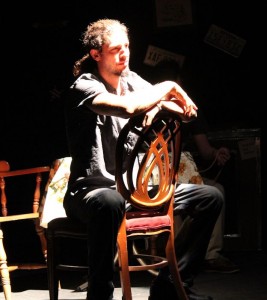 husky” to “slim.” Now he fears that if she knew the truth, she’d similarly seek to change his label from “gay” to “straight.” Larman makes you root for Ty to get what he wants and needs – but, alas, his relationship with Latrelle has always been characterized by denial and disappointment.
husky” to “slim.” Now he fears that if she knew the truth, she’d similarly seek to change his label from “gay” to “straight.” Larman makes you root for Ty to get what he wants and needs – but, alas, his relationship with Latrelle has always been characterized by denial and disappointment.
Earl “Brother Boy” Ingram gave up long ago on winning his own mother’s love and acceptance. But he sorely wants and needs to get out of the asylum Peggy Ingram put him in 23 long years ago for being a gay man who prefers to dress as a woman, or to be more precise, as that iconic country diva, 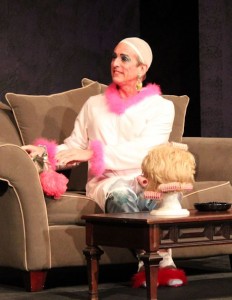 Ms. Tammy Wynette. Ken Johnson plays the part with an astonishing depth of understanding tinged by pervasive sadness. It’s not an easy feat to accomplish, especially in red six-inch stilettos.
Ms. Tammy Wynette. Ken Johnson plays the part with an astonishing depth of understanding tinged by pervasive sadness. It’s not an easy feat to accomplish, especially in red six-inch stilettos.
Standing in the way of Brother Boy’s release is Dr. Eve Bolinger, played to the hilt by Sandra Dixon. She’s determined to de-homosexualize “Brother Boy” by any means necessary, even seducing him right there in her office. She couldn’t care less about Brother Boy. She’s after a book deal, an appearance on Oprah, and sweet release from the stultifying confines of the institution in which she works. Dixon’s version of Dr. Evil is memorable – 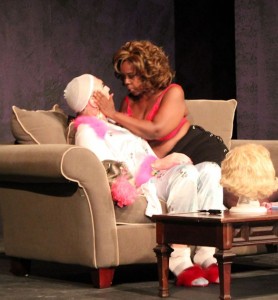 and more than a little disturbing.
and more than a little disturbing.
Shelley Rae Sanders reprises the role of Bitsy Mae Harling, and she croons like a minstrel, often walking down the aisle from the back of the house to provide a spellbinding distraction as the cast and stagehands feverishly change sets and props between scenes. Sanders hits all the right notes in her rendition of the title song, “Sordid Lives.” Remarkably, she learned to play the guitar just for this show. Those familiar with Sanders’ work won’t be surprised. She’s always up for a challenge and never shies away from putting herself 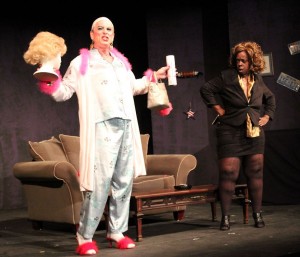 out there for the good of a role.
out there for the good of a role.
A couple of years ago Del Shores was asked why he thought “Sordid Lives” has become such a cult phenomenon, particularly in the gay community. He credits the film – and its release in the tourist mecca of Palm Springs – with “Sordid Lives’” phenomenal popularity. While that’s no doubt the case, all of us struggle for the same things that Shores’ characters want throughout the course of the movie and 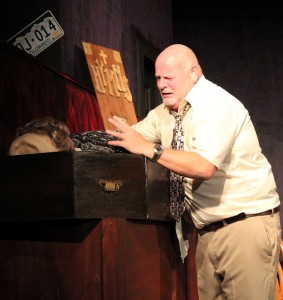 eponymous play.
eponymous play.
Love and acceptance are universal, primordial needs. While members of the LGBTQ community may feel their deprivation more keenly than most, everyone strives and struggles to get love and acceptance from their families and friends. That’s why “Sordid Lives” strikes a responsive chord with everyone who sees it.
It will with you, too.
“Sordid Lives” is not just a great play with which to open a new season. It’s a salve for open wounds. It is an elixir for what ails you 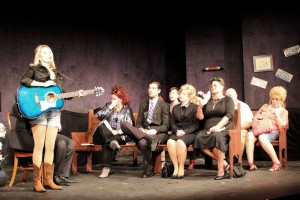 in this post-Hurricane Irma dystopian world in which we currently find ourselves.
in this post-Hurricane Irma dystopian world in which we currently find ourselves.
September 20, 2017.
RELATED POSTS.
- ‘Sordid Lives’ play dates, times and ticket info
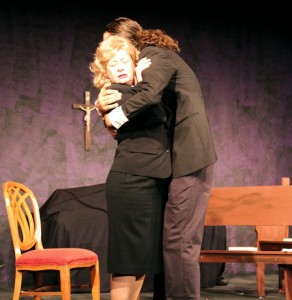 Shelley Rae Sanders is Bitsy Mae Harling in Lab’s ‘Sordid Lives’
Shelley Rae Sanders is Bitsy Mae Harling in Lab’s ‘Sordid Lives’- Patrick Erhardt is Wardell ‘Bubba’ Owens in Lab’s ‘Sordid Lives’
- Joann Haley is Latrelle Williamson in Lab’s ‘Sordid Lives’
- Cindi Leake Heimberg is Lavonda Dupree in Lab’s ‘Sordid Lives’














 Tom Hall is both an amateur artist and aspiring novelist who writes art quest thrillers. He is in the final stages of completing his debut novel titled "Art Detective," a story that fictionalizes the discovery of the fabled billion-dollar Impressionist collection of Parisian art dealer Josse Bernheim-Jeune, thought by many to have perished during World War II when the collection's hiding place, Castle de Rastignac in southern France, was destroyed by the Wehrmacht in reprisal for attacks made by members of the Resistance operating in the area. A former tax attorney, Tom holds a bachelor's degree as well as both a juris doctorate and masters of laws in taxation from the University of Florida. Tom lives in Estero, Florida with his fiancee, Connie, and their four cats.
Tom Hall is both an amateur artist and aspiring novelist who writes art quest thrillers. He is in the final stages of completing his debut novel titled "Art Detective," a story that fictionalizes the discovery of the fabled billion-dollar Impressionist collection of Parisian art dealer Josse Bernheim-Jeune, thought by many to have perished during World War II when the collection's hiding place, Castle de Rastignac in southern France, was destroyed by the Wehrmacht in reprisal for attacks made by members of the Resistance operating in the area. A former tax attorney, Tom holds a bachelor's degree as well as both a juris doctorate and masters of laws in taxation from the University of Florida. Tom lives in Estero, Florida with his fiancee, Connie, and their four cats.